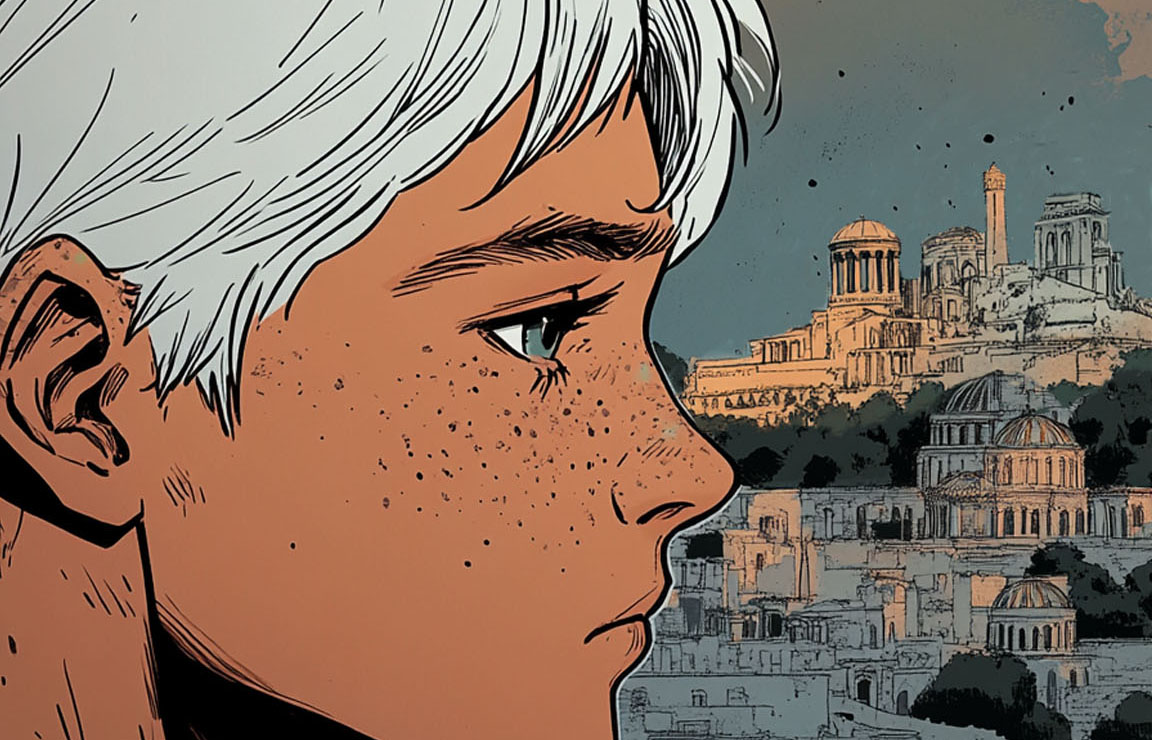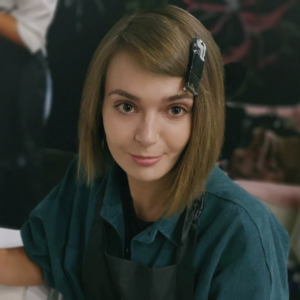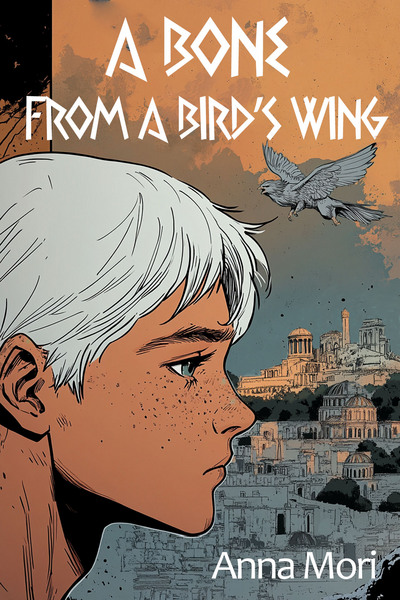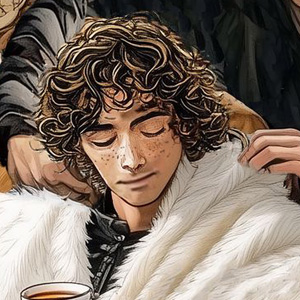Narseh
A painful, prolonged scream echoed from the adjacent room. Narseh filled a bowl with water and cast a glance through the doorway: a woman lay clutching her partner's hand, her sightless eyes staring into the distance — toward the Other Side.
This is why women usually get along with the Other Side better than men and are able to remain sane there longer: they are the ones who bring new life to This Side. Childbirth, in a way, resembles summoning a fravashi: in both cases, the Unknown transforms into the Manifested. But summoning a dark twin is a distorted, inverted reflection meant only for killing. Childbirth is the true, most powerful magic.
Narseh wiped sweat from his forehead. The water was meant for the laboring woman, but he couldn’t resist taking a sip himself. His mind was slightly ajar, just enough for a healer to monitor a patient’s well-being and ensure everything was proceeding as it should. Even that small opening was painful.
The child was about to be born.
Narseh brought the bowl to the woman’s lips. She drank greedily and at length. Only then, blinking, did she finally see him, and not the visions she had been lost in before.
In her mainyu, he sensed the question: “Is this how it’s supposed to be?” amidst a fence of fear. This was her first childbirth.
Narseh sent her an encouraging, “Everything is wonderful.” She saw he was telling the truth, and fear dissipated from her thoughts. A contraction shook her body. The small red hairless head of the baby showed between her legs.
Everything was going remarkably well. Yes, it was difficult and unbearably painful, but by childbirth standards, it was extraordinarily smooth and incredibly quick — there wouldn’t even be a need for stitches. A fleeting thought crossed Narseh’s mind: what if this child...
He cut the umbilical cord. The baby girl was terribly ugly and wrinkled, that is, she turned out to be a perfectly ordinary, healthy newborn. Normal height and weight, a good, non-bluish skin tone. Her breathing and heartbeat were fine, too. But instead of crying after her first breaths, she gazed at Narseh with almond-shaped gray eyes, strangely serious, and he became certain of his suspicion.
He placed the child on her mother’s chest. The woman pressed the baby against herself, trembling from a double relief—physical and emotional. The girl began nursing but continued to glance at Narseh with an oddly deliberate look. He felt slightly uneasy, as though looking at someone else’s fravashi.
“Thank you,” the man whispered. His mainyu had been open this whole time, far more so than Narseh’s; he had shared every feeling his partner experienced. Tears streamed down his face.
Narseh was not the only healer in Eranshahr, nor did he belong to the Owl clan, yet people trusted him as much, if not more, than other doctors. This was partly because he was the Prince’s adviser and partly because of his healing farn. Fortunately, his farn wasn’t needed this time. Narseh said so:
“I didn’t do anything. I just watched. Your partner did everything herself, as it ideally should be.”
Still, the infant was highly unusual. Curiosity gnawed at Narseh, so he asked, “Is the girl’s father you?”
Occasionally, though rarely, women decided to keep children conceived during full moon games, even without knowing who the father was. After all, all children of the clan were, to some degree, shared. But this was not one of those cases.
Both of their mainyu lit with pride: “This child is from Imprinting.”
“How lucky you are!” Narseh exclaimed, pleased both by the revelation and that his guess was correct. “This is the second time I have ever seen such a child.”
Children from Imprinting were marked by a special connection to the Other Side. They always succeeded in bonding with their fravashi; never had a child from Imprinting died or gone mad during the test of adulthood. Their fravashi were always immensely powerful, and they themselves possessed rare and formidable farns. Such children were believed to bring great prosperity and fame to their clan. But more importantly, children from Imprinting were a true joy and solace to their parents. With ordinary children, you could never be sure if you would lose them. Half of all children failed the test of adulthood, which often made parents wary of loving them too deeply. Those who dared often came to regret it.
“Her father was Tiridath of the Raven clan,” the woman murmured faintly. Too weak to speak, she continued in thought: “I didn’t know him well, but he seemed like a good man.”
“It’s improper to say so, but — I’m glad you never got to know him,” her partner said, with a hint of jealousy.
The woman laughed softly: “Imprinting only seems romantic to those who haven’t experienced it. We did what we had to, nothing more. You know I wouldn’t want to spend my life with anyone but you.”
“What happened to him?” Narseh asked. Clearly, if Tiridath were alive, he wouldn’t have missed the birth of his daughter, even if he had no bond with the mother.
“The same thing that happens to everyone: war,” she answered.
“May he be remembered long and warmly,” Narseh said, clasping his hands in a gesture of remembrance. “I’m sure he would have been glad to see this beautiful child. Have you decided on a name for her?”
“We’re thinking of naming her Anahita,” the man said. “Maybe our daughter will be as strong and unyielding, embodying the spirit of our people.”
Narseh’s smile turned wry. Prince Ardashir wouldn’t be pleased to hear this. Naming children after the brave Anahita, leader of the Owl clan, martyr to the ideals of the Arya, who had been tortured to death by the cruel Prince for his mad dreams of peace with the murderers… Yes, let someone else inform him of this child. Someone certainly would; a child from Imprinting was a major event.
And Narseh now had no desire to see Prince Ardashir or speak to him at all.
Not after the disastrous conversation they’d had the day after the council, when Narseh nevertheless decided to question the Prince frankly.
“If you have decided to cheat with fate, will you take the responsibility of holding other people's threads in the palm of your hand?"
Those words had etched themselves into Narseh’s memory, their ominous meaning growing sharper with every recollection.
Narseh had the right to enter Ardashir’s grotto uninvited. So did Justin and likely many others; the bond of a life saved worked both ways. But few, if any, exercised this right often. Narseh used to — and he recognized it as a mark of high trust and closeness, though he couldn’t quite understand what he’d done to deserve it.
The grotto was filled with lively disarray. Clothes and many owl feathers were scattered on the floor and bed, and he noted that the white clay device for brewing the infusion of the leaves of the shrub called cha in the land of Chin had not been cleaned for a long time. Despite Narseh’s love for order, he had always liked this place. The evening sun’s rays still fell through the patterned glass of the skylights in the ceiling, but several lamps of various shapes and sizes already burned in the grotto. Rooms smelled of coziness and peace: wool and dust, resinous wood, animal hides, paper and leather of manuscripts. Books often changed (though some stayed forever), and the variety of reading materials sometimes amazed Narseh. Today, on the table lay a Sugdian translation of Sun Tzu’s The Art of War (one of the books Narseh had seen here many times before), as well as a Sanskrit poem and a stack containing one of Ptolemy’s volumes of Geography and a Chin treatise also on geography. On the bed were a couple of entertaining novels from Bizanth, one by Apuleius and the other by Petronius Arbiter — both of which, Narseh had heard from Justin, were rather bawdy.
But this time, he had no interest in enjoying the cozy atmosphere or studying the books. He stopped under the arch leading to the sleeping area, like a shadow.
“My Prince,” he said. The dullness of his own voice stabbed under his skin like a splinter.
The prince was half-reclining on the bed. Worst of all, he didn’t look stern or detached today — he might even have reached out to Narseh with his thoughts, as usual, had Narseh’s mind not been slammed shut, like a stove damper...
“Hello, Narseh.”
“I have questions, my Prince. And you won’t like them. Perhaps it's better for you to send me away immediately…”
Ardashir replied with slight mockery, “Let me decide what’s better for me.”
“How many Threadweavers have you visited?”
For some reason, Narseh had expected Ardashir to evade the question. He was wrong.
“I go to all of them.”
Narseh blinked in confusion. “You escort all twelve clans’ Threadweavers on their final journeys?”
“Yes.”
“And how long have you been doing this?”
“For several years.”
Narseh had prepared himself for something like this, but still, when he voiced his guess, it sounded wild:
“Are you trying to compile some sort of… map of the future from their predictions?”
“‘The future is not a map. Nor is it a set of fixed points. It’s a multitude of possibilities, constantly shifting and diverging. But yes, in essence, you’ve guessed correctly.”
“How… how did you even get this idea?”
Truthfully, Narseh was less concerned about the answer than he appeared; he asked out of sheer bewilderment. Yet the prince seemed energized by the question: he stood up, moved to the table, and rested his chin on interlaced fingers.
“It happened this way. I often escort the fallen — after all, I can transport them to the place they wish to see one last time… You know this. One day, I made this offer to a Threadweaver without any intention of prying into a prophecy. There was no one else to guide his soul. I don’t know if it brings them much comfort; they are blind and their minds are already halfway in the Other Side. Still, he did not refuse. He wanted to die on a mountaintop, lying in the snow, with snowflakes falling on his face. I brought him there, along with the one to whom he intended to deliver his prophecy. And so, by accident, I became a witness to a prophecy that wasn’t meant for me. Then it happened again. And I saw an opportunity here.” Ardashir’s eyes glinted with fervor. “The more prophecies I heard, the more I saw… so to speak, pitfalls I could bypass; the clearer the road between those pitfalls became, it was as if it was folding itself in front of me...”
Narseh could no longer listen.
“Tell me,” he asked, his voice alien to him, “Did you let Justin go to the Iron Pass?”
A pause.
“Yes.”
“Then send me with him to these negotiations. If I am nearby, I’ll worry less about him.”
This time, Ardashir didn’t hesitate for a moment:
“No. I can’t let you go.”
“Why?! I could be useful there! You’re sending Roxhana — how am I less capable than she is?! I also know the language and customs of Bizanth. And if something happens — well, I’m almost as strong as she is, though I can’t leap through the Other Side and… Wait… Is something going to happen? Something bad?!”
“Narseh, I will not discuss prophecies with you,” the Prince said restrainedly. “I forbid you to go, that's all.”
“I don’t understand. Did you learn something about these negotiations? And yet you insisted on them? But… why?”
Silence.
“Will I at least see him again?” Narseh asked helplessly.
The Prince took pity on him at last.
“This is the first and last time I’ll tell you anything about the future. The negotiations at the Iron Pass and Justin’s death are not connected — although, of course, in a broader sense, everything is connected in some way. But these are not adjacent events. Don’t fixate on the negotiations; he will not die there—I’m absolutely certain of that. In the end, the Threadweaver prophesied that he would have a chance to meet with his girl, his Daisy. So yes, you will see him again.”
He did not say it lightly, not as if it were a trifle, but seriously, even sympathetically. And yet it sounded too merciless, too… calculated. As if people were pieces in a game to be placed on their designated squares.
Or rather, on squares not meant for them…
Narseh exploded with anger:
“You are playing with forces beyond human comprehension! You try to shape the world, but you cannot predict the consequences of your choices!”
“From the moment we are born, we try to shape the world, and no one can predict the consequences of their choices. So, what do you suggest? That no one ever makes any decisions?”
“This is not the same! You’ve taken it upon yourself to play chess with fate. But this is beyond human power! If there's a rock in the path of a boat, no one can remove it!”
“I am not trying to remove the rock. At best, I am steering the boat around it. And sometimes, I feel it is better to let the boat crash.”
Narseh could no longer contain himself. He had crossed every boundary long ago. It was inevitable that the prince would drive him out of Eranshahr, but before that, he would say everything that had been simmering inside him:
“That arrogance of yours… Just listen to yourself… Humans cannot win against fate! It never ends well!”
“And yet, for several years now, I have managed to act successfully enough that even other clans have entrusted their safety to me. You’re right, one cannot argue with fate! But isn’t fate everything that happens? Including me, and all my attempts to save boats from crashing?” Ardashir objected. It seemed that this oppressive conversation genuinely intrigued him, though Narseh still couldn’t believe they were discussing this seriously.
“Say what you will. You dress lies in the guise of logical reasoning, but it remains a lie nonetheless. The Bizantines even have a word for it: ‘sophistry.’ This is just—just arrogance! Do you think yourself incapable of mistakes?”
Ardashir raised an eyebrow. “Of course I am capable of them. Like any other person. Why are my mistakes the ones that upset you so?”
“Because your missteps cost — or have already cost — far more than those of most people!”
The prince rose. Leaning his hands on the edge of the table, he inclined slightly toward Narseh and said quietly:
“Do you think I don’t understand that myself? But since I have chosen not to remain idle, I have also chosen to make mistakes.”












Comments (0)
See all